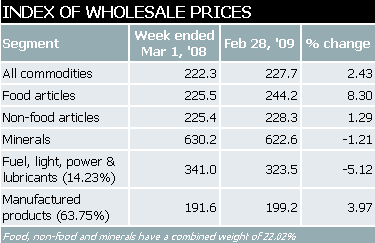Consumers are unlikely to get any relief from high food prices, even though the wholesale price index-based inflation has touched a six-year low of 2.43 per cent.
The food-price segment in the WPI has been growing at 8.3 per cent, much higher than the rise in the index for manufactured articles. In fact, segments like minerals and fuel have witnessed a decline in the WPI and have pulled the inflation down. The rise in food prices affects the common man more than the increase in prices of any other item.
The spurt at the retail level for a variety of products is even sharper. The rise in retail prices of everyday food items like rice, sugar, pulses and tea is up in the range of 22-47 per cent over the year-ago prices, while items like wheat have stabilised.
Analysts say the high minimum support price has fuelled retail prices. "The MSP has been rising year after year and retail prices of wheat and rice tend to stay above this price. Since we are primarily import dependent in edible oil, the currency depreciation is making import expensive," said D K Joshi, principal economist, Crisil. The gains in inflation reduction in future would not come from food items but from the manufacturing sector and fuel, he added.
Edible oil prices, which have dipped from their record levels in mid-2008, are firming up again. Palm oil prices are expected to witness an uptrend during the first half of the calendar year and weaken in the second half, Dorab E Mistry, director, Godrej [Get Quote] International Ltd, said at a recent seminar.
 Sugar has seen the sharpest rise among all food items, as its output in the 2008-09 season (October-September) is likely to touch a four-year low of 16 million tonnes, owing to a sharp decline in sugarcane acreage. The government has taken measures like allowing raw sugar imports at nil duty, imposing stock limits and increasing the quota for sale to check its price.
Sugar has seen the sharpest rise among all food items, as its output in the 2008-09 season (October-September) is likely to touch a four-year low of 16 million tonnes, owing to a sharp decline in sugarcane acreage. The government has taken measures like allowing raw sugar imports at nil duty, imposing stock limits and increasing the quota for sale to check its price.
The grain output for the year is also down 1.26 per cent to 227.88 million tonnes, as weather played a spoilsport in the kharif season. Domestic oilseeds crop for the year is also down over 12 per cent, thereby increasing the reliability on imports.
Powered by 
 Sugar has seen the sharpest rise among all food items, as its output in the 2008-09 season (October-September) is likely to touch a four-year low of 16 million tonnes, owing to a sharp decline in sugarcane acreage. The government has taken measures like allowing raw sugar imports at nil duty, imposing stock limits and increasing the quota for sale to check its price.
Sugar has seen the sharpest rise among all food items, as its output in the 2008-09 season (October-September) is likely to touch a four-year low of 16 million tonnes, owing to a sharp decline in sugarcane acreage. The government has taken measures like allowing raw sugar imports at nil duty, imposing stock limits and increasing the quota for sale to check its price.
